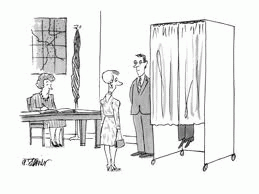Cartoon from To The Point Analyses
Soon it will be presidential voting time again in the United States. That four-year cycle comes to us with the regularity of a returning comet, accompanied by a shroud of campaign fog that makes a guessing game of discerning fact from fiction when it comes to political promises.
A hefty minority have opted out of this process. Thus, if history runs consistent, when the designated day in November arrives, between 38 and 40 percent of America's eligible voters will automatically (without even thinking about it) stay away from the polls. Voting appears not to be part of their local culture. They obviously do not think the results touch them in a personal way, or they feel their vote is meaningless, or they see the candidates as irredeemable liars not to be taken seriously.
The behavior of this sizable minority is not in doubt. But there is yet another group of eligible voters whose actions in November are in doubt. These are people who are regular voters, but are now so put off by their usual party candidate that they refuse to support him. They will either not vote at all or cast a vote for a minor third party.
Back in 2000 and again in 2004, when George W. Bush stood for election, a good number of moderate Republicans suffered a voting dilemma of this sort. Seeing the Republican Party of Dwight Eisenhower and Nelson Rockefeller (whatever those on the Left might think of these folks) taken over by a proven neo-con screwball like Bush Jr. must have made many of them hesitate to vote in their usual fashion. Maybe that's why the elections were so close that only a series of fraudulent maneuvers got W. elected.
This year an unknown number of progressive Democrats might feel they are facing a similar dilemma. The level of disappointment with Barack Obama among progressives is palpable. He has carried on his predecessor's attack on civil liberties, bailed out the banks instead of jailing the bankers, failed to fight for a public option to healthcare, kowtowed to the Zionists, and used drones to kill (mostly) civilians. That is just a partial list of complaints.
One can counterbalance this with a list of good things that Obama has done (withdrew from Iraq, endorsed gay marriage, restored stem cell research, etc.), or argue that at least some of the bad things were a consequence of Republican roadblocks. Still, for those on the progressive end of the Democratic spectrum, Obama is a profound disappointment.
So what do you do? Seek out the Green Party and vote for its candidate, Jill Stein, or boycott the polls altogether? Are such responses to the voting dilemma good ideas?
Well, let's take a look at recent history. Robert Parry of Consortiumnews.com explored this question by looking at the presidential election of 1968. In that year, amidst a worsening war in Vietnam, Democratic President Lyndon Johnson decided not to run for reelection. There was strong progressive support for the party's anti-war candidate, Eugene McCarthy, but his candidacy failed on the Democratic convention floor and the party nominated Johnson's Vice President Hubert Humphrey, a man who was closely identified with the war effort.
His Republican rival would be Richard Nixon, a duplicitous and dishonest fellow who was also paranoid and egocentric to a fault. Prior to the election Nixon had secretly encouraged the South Vietnamese not to join in Johnson's efforts to open peace negotiations with North Vietnam. After the election he would expand the war into Laos and Cambodia. Ultimately, Nixon self-destructed with the Watergate scandal.
Parry interviewed Sam Brown, a prominent progressive of that time who served as Eugene McCarthy's Youth Coordinator. When Humphrey became the Democratic candidate and refused to disown an increasingly disastrous war, Brown and those like him faced their voting dilemma.
Humphrey's supporters sought to bring these progressives back into the fold by arguing, "Humphrey is a good guy, trust us." That went over like a lead balloon and the Democrats lost an unknown number of antiwar voters. Perhaps Nixon would have won anyway, but the situation certainly hurt Humphrey's chances for election.
Today, Sam Brown "is not proud" of the fact that in 1968 he "cast his ballot for a minor third-party candidate as a throwaway vote." He sees his action as a de facto assist to Nixon's campaign
Brown has his own personal history to look back at and that helps shape his present perspective. Not everyone has this experiential background, nor do many bother to research the past for guidance in a moment of present and personal political crisis. Given this situation it may be a better approach to consider a few questions that might help resolve the voting dilemma...
(Note: You can view every article as one long page if you sign up as an Advocate Member, or higher).





